When You Are Old"WHEN you are old and grey and full of sleep, And nodding by the fire, take down this book, And slowly read, and dream of the soft look Your eyes had once, and of their shadows deep; How many loved your moments of glad grace, And loved your beauty with love false or true, But one man loved the pilgrim soul in you, And loved the sorrows of your changing face; And bending down beside the glowing bars, Murmur, a little sadly, how Love fled And paced upon the mountains overhead And hid his face amid a crowd of stars.W.b. Yeats
Had I the heavens' embroidered cloths, Enwrought with golden and silver light, The blue and the dim and the dark cloths Of night and light and the half light, I would spread the cloths under your feet: But I, being poor, have only my dreams; I have spread my dreams under your feet; Tread softly because you tread on my dreams.W.b. Yeats
Never give all the heart, for love Will hardly seem worth thinking of To passionate women if it seem Certain, and they never dream That it fades out from kiss to kiss; For everything that's lovely is But a brief, dreamy, kind delight. O Never give the heart outright, For they, for all smooth lips can say, Have given their hearts up to the play. And who could play it well enough If deaf and dumb and blind with love? He that made this knows all the cost, For he gave all his heart and lost.W.b. Yeats
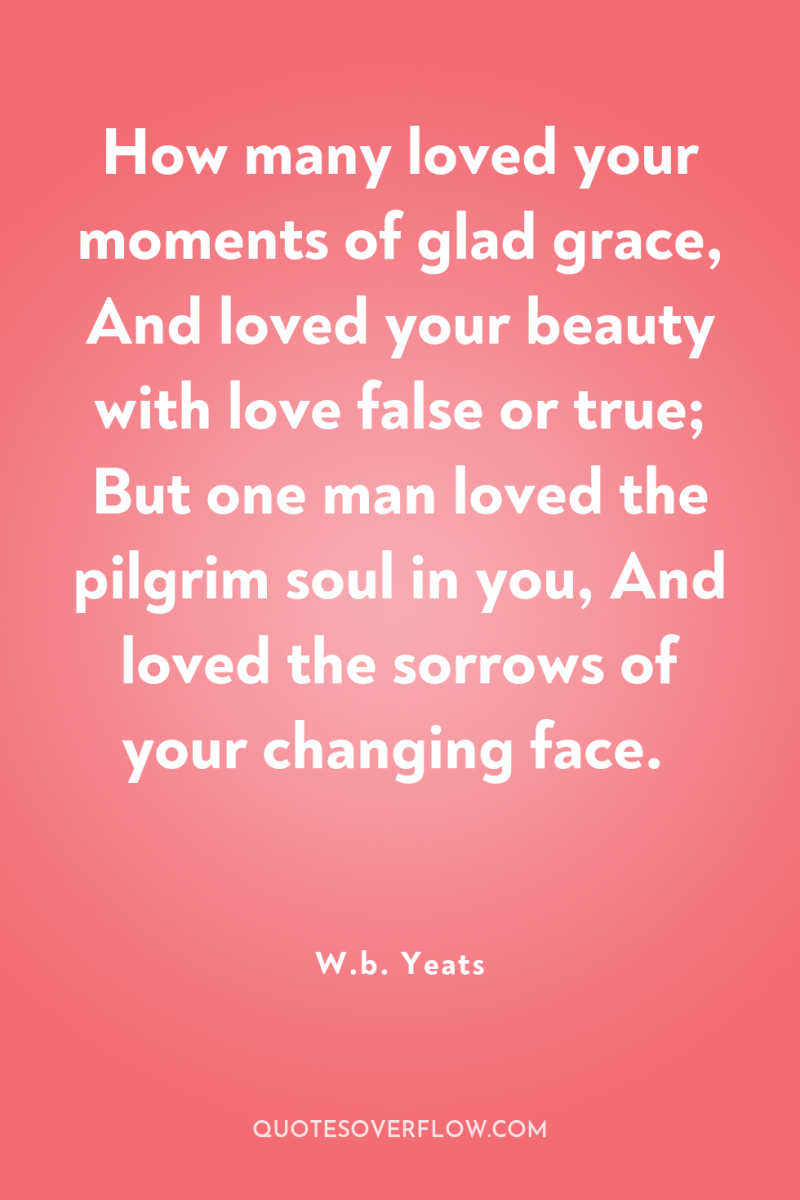
How many loved your moments of glad grace, And loved your beauty with love false or true; But one man loved the pilgrim soul in you, And loved the sorrows of your changing face.W.b. Yeats
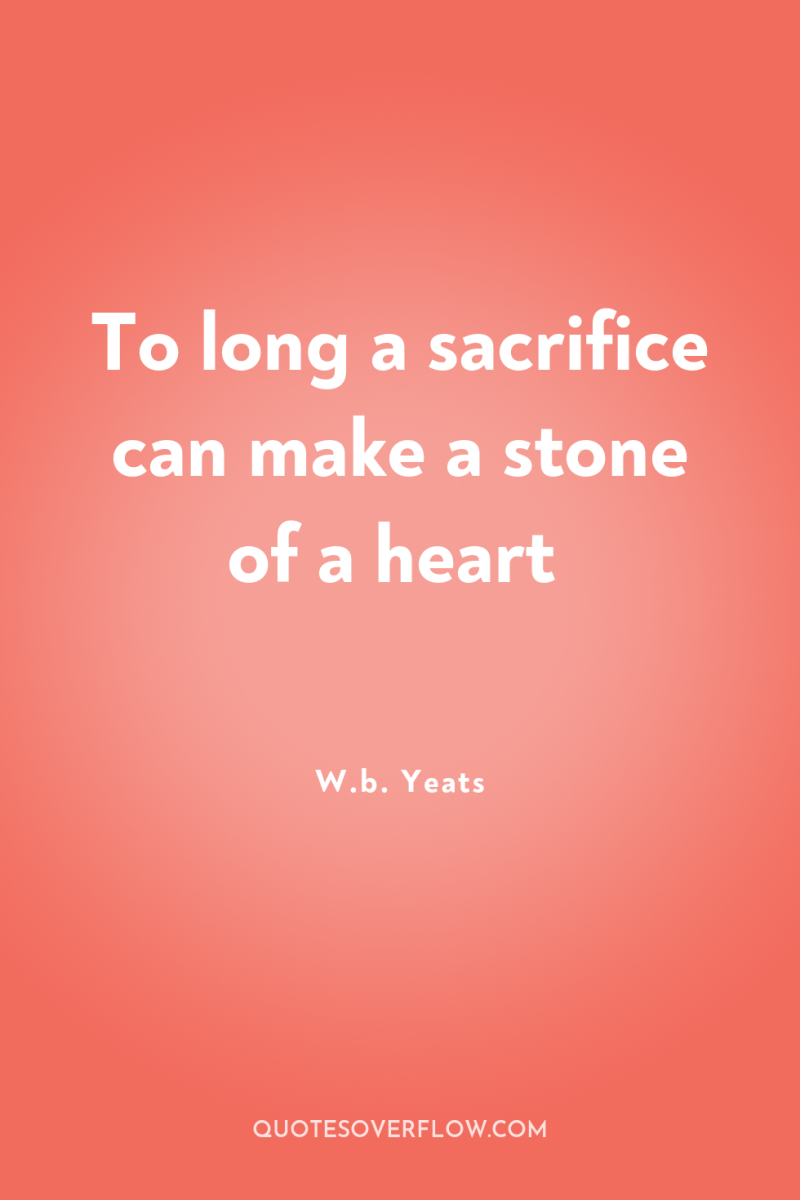
To long a sacrifice can make a stone of a heartW.b. Yeats
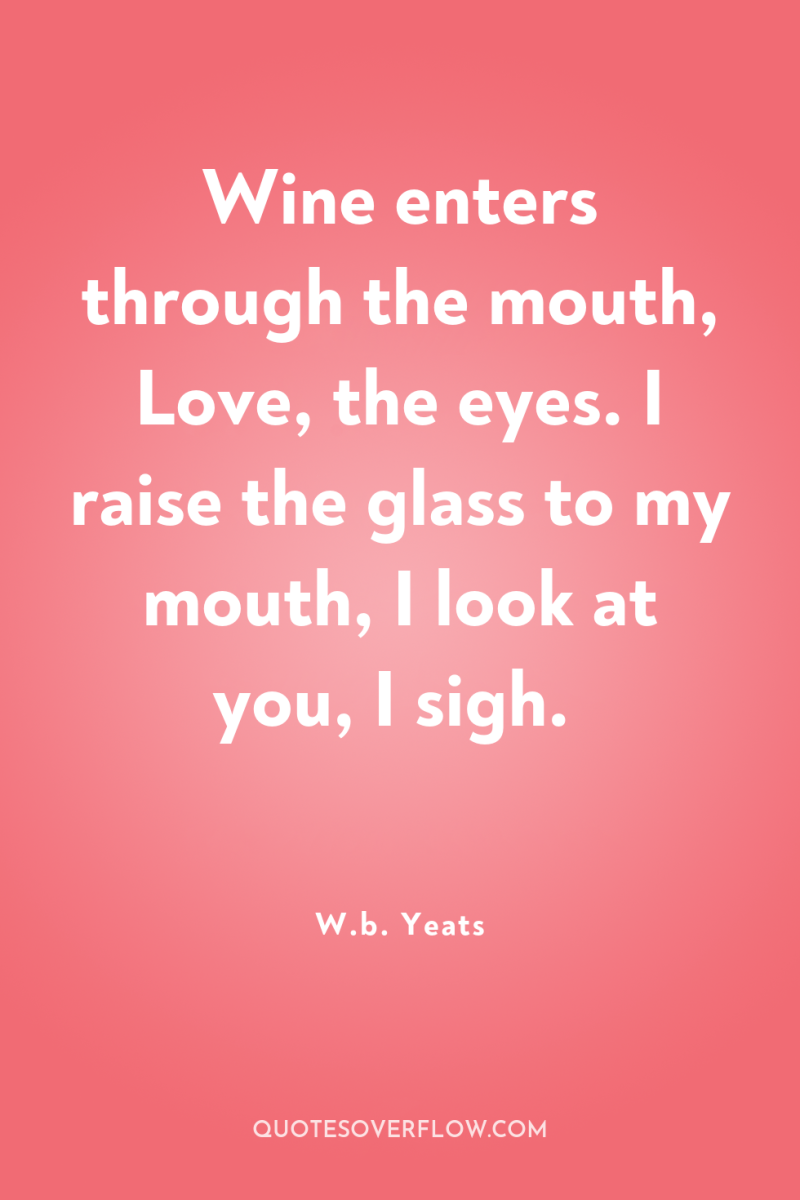
Wine enters through the mouth, Love, the eyes. I raise the glass to my mouth, I look at you, I sigh.W.b. Yeats
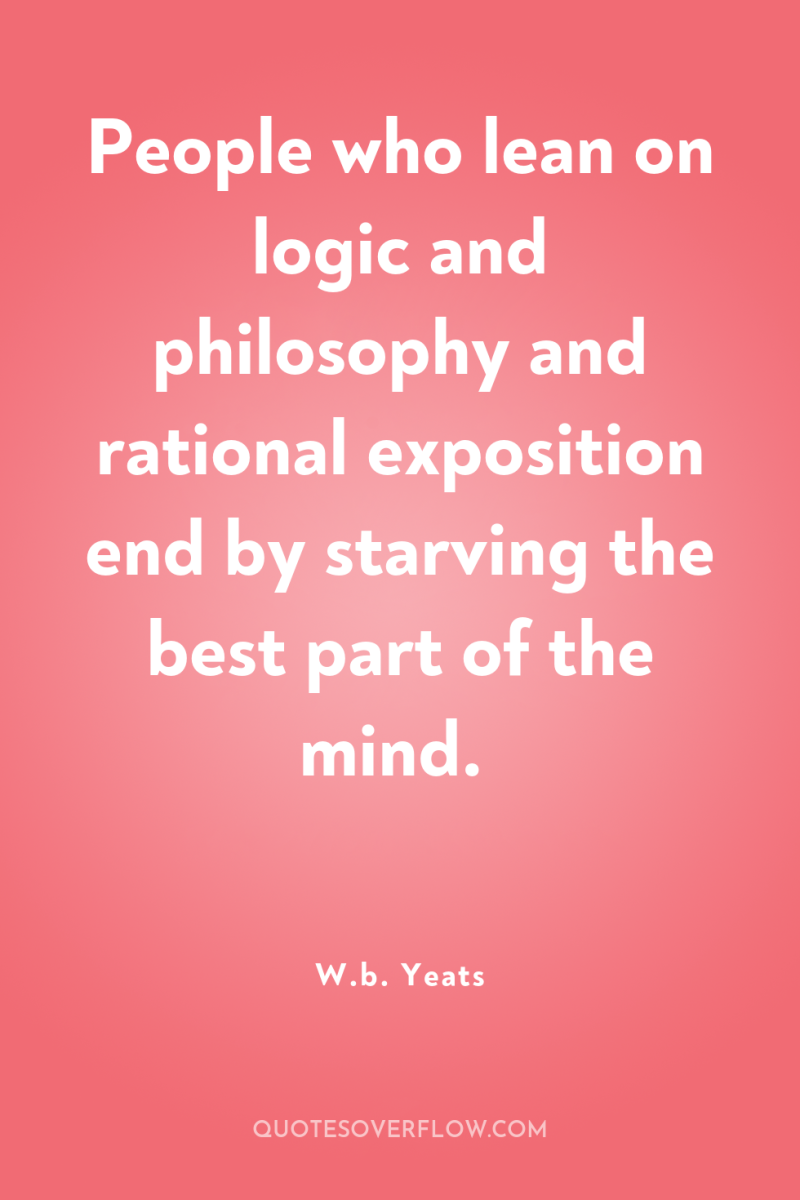
People who lean on logic and philosophy and rational exposition end by starving the best part of the mind.W.b. Yeats
The portraits, of more historical than artistic interest, had gone; and tapestry, full of the blue and bronze of peacocks, fell over the doors, and shut out all history and activity untouched with beauty and peace; and now when I looked at my Crevelli and pondered on the rose in the hand of the Virgin, wherein the form was so delicate and precise that it seemed more like a thought than a flower, or at the grey dawn and rapturous faces of my Francesca, I knew all a Christian's ecstasy without his slavery to rule and custom; when I pondered over the antique bronze gods and goddesses, which I had mortgaged my house to buy, I had all a pagan's delight in various beauty and without his terror at sleepless destiny and his labour with many sacrifices; and I had only to go to my bookshelf, where every book was bound in leather, stamped with intricate ornament, and of a carefully chosen colour: Shakespeare in the orange of the glory of the world, Dante in the dull red of his anger, Milton in the blue grey of his formal calm; and I could experience what I would of human passions without their bitterness and without satiety. I had gathered about me all gods because I believed in none, and experienced every pleasure because I gave myself to none, but held myself apart, individual, indissoluble, a mirror of polished steel: I looked in the triumph of this imagination at the birds of Hera, glowing in the firelight as though they were wrought of jewels; and to my mind, for which symbolism was a necessity, they seemed the doorkeepers of my world, shutting out all that was not of as affluent a beauty as their own; and for a moment I thought as I had thought in so many other moments, that it was possible to rob life of every bitterness except the bitterness of death; and then a thought which had followed this thought, time after time, filled me with a passionate sorrow.W.b. Yeats
Hope and Memory have one daughter and her name is Art, and she has built her dwelling far from the desperate field where men hang out their garments upon forked boughs to be banners of battle. O beloved daughter of Hope and Memory, be with me for a while.W.b. Yeats
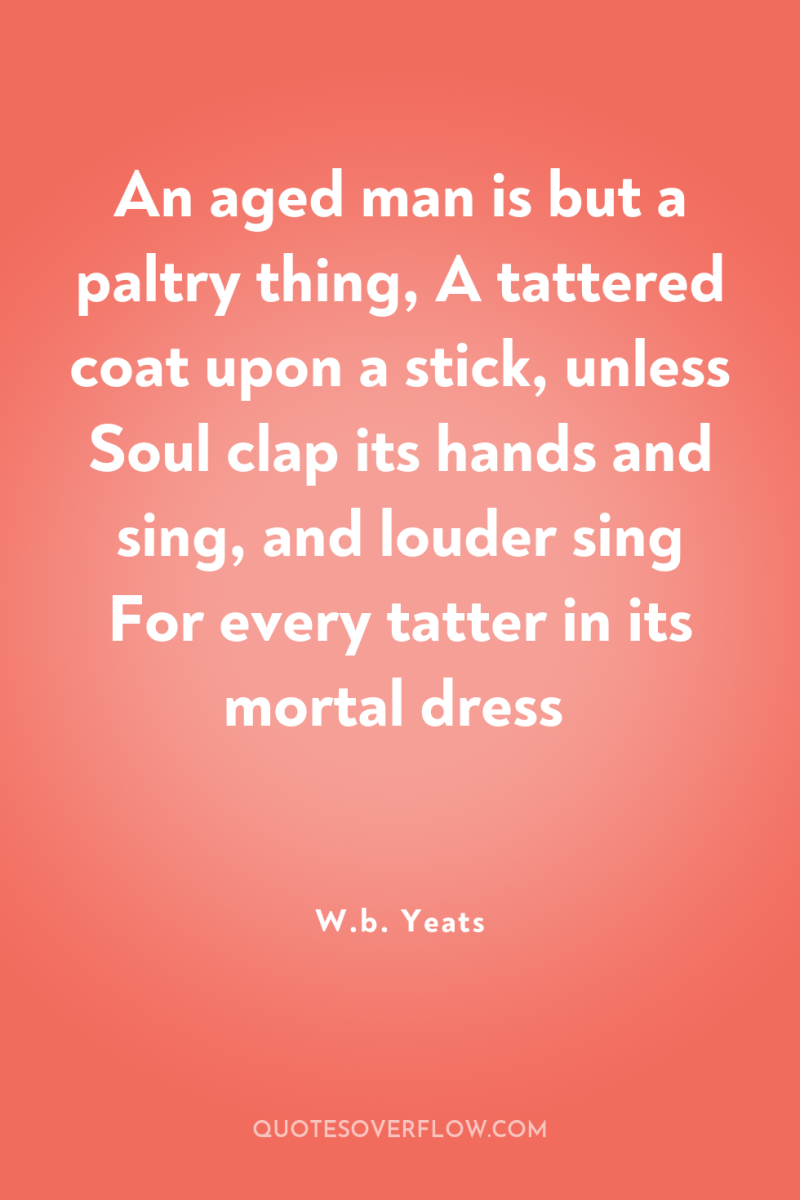
An aged man is but a paltry thing, A tattered coat upon a stick, unless Soul clap its hands and sing, and louder sing For every tatter in its mortal dressW.b. Yeats
Before me floats an image, man or shade, Shade more than man, more image than a shade; For Hades' bobbin bound in mummy-cloth May unwind the winding path; A mouth that has no moisture and no breath Breathless mouths may summon;(" Byzantium")W.b. Yeats
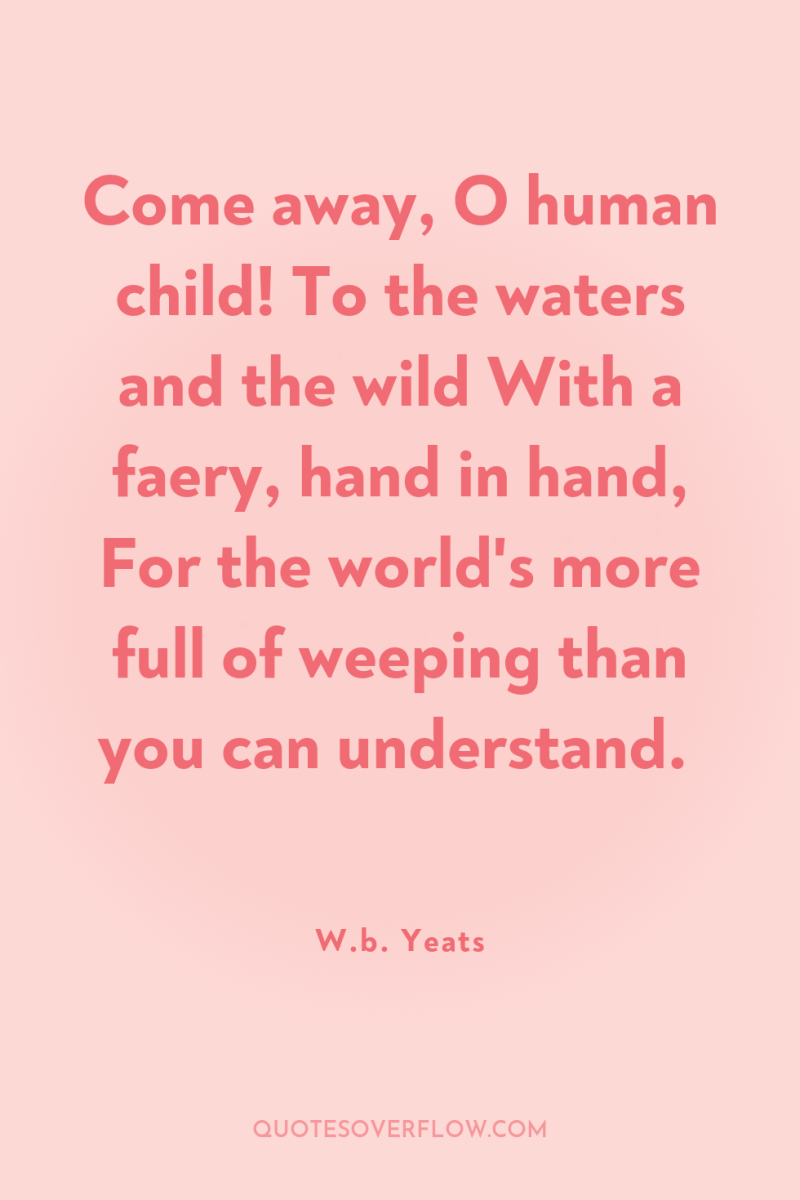
Come away, O human child! To the waters and the wild With a faery, hand in hand, For the world's more full of weeping than you can understand.W.b. Yeats
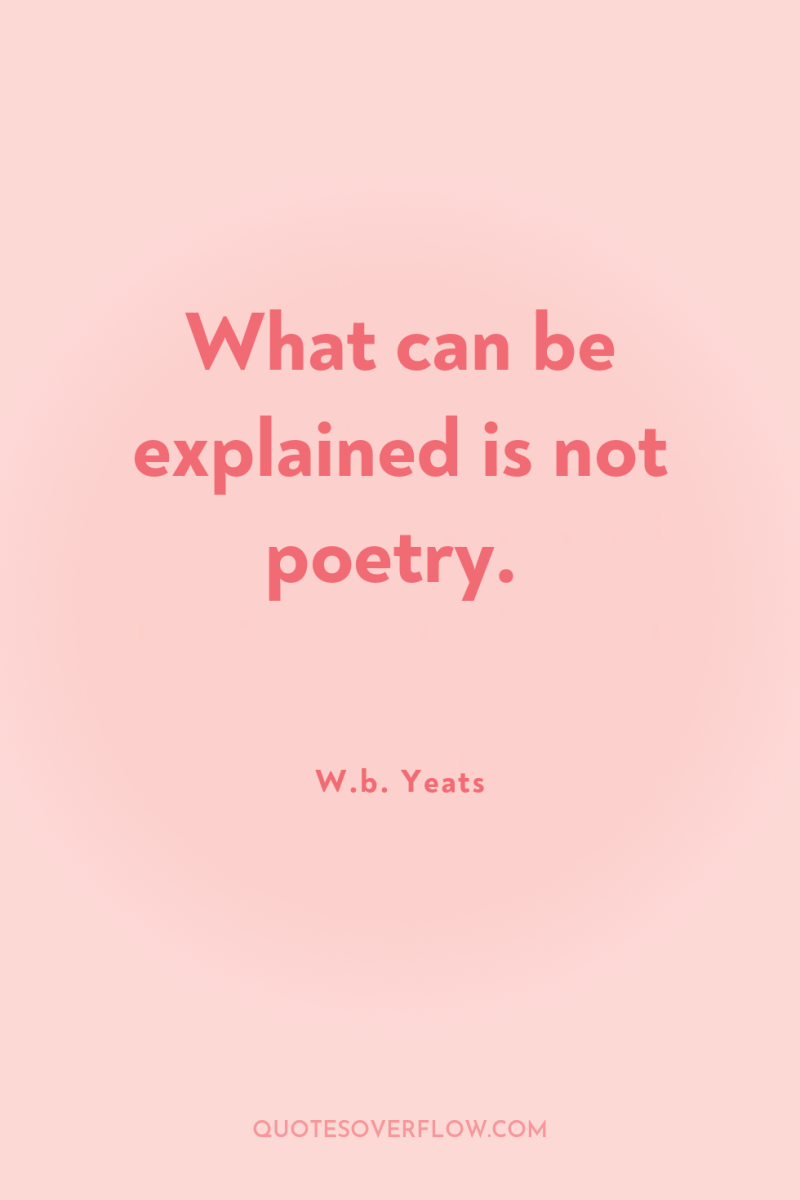
What can be explained is not poetry.W.b. Yeats
Turning and turning in the widening gyre The falcon cannot hear the falconer; Things fall apart; the centre cannot hold; Mere anarchy is loosed upon the world, The blood-dimmed tide is loosed, and everywhere The ceremony of innocence is drowned; The best lack all conviction, while the worst Are full of passionate intensity.W.b. Yeats
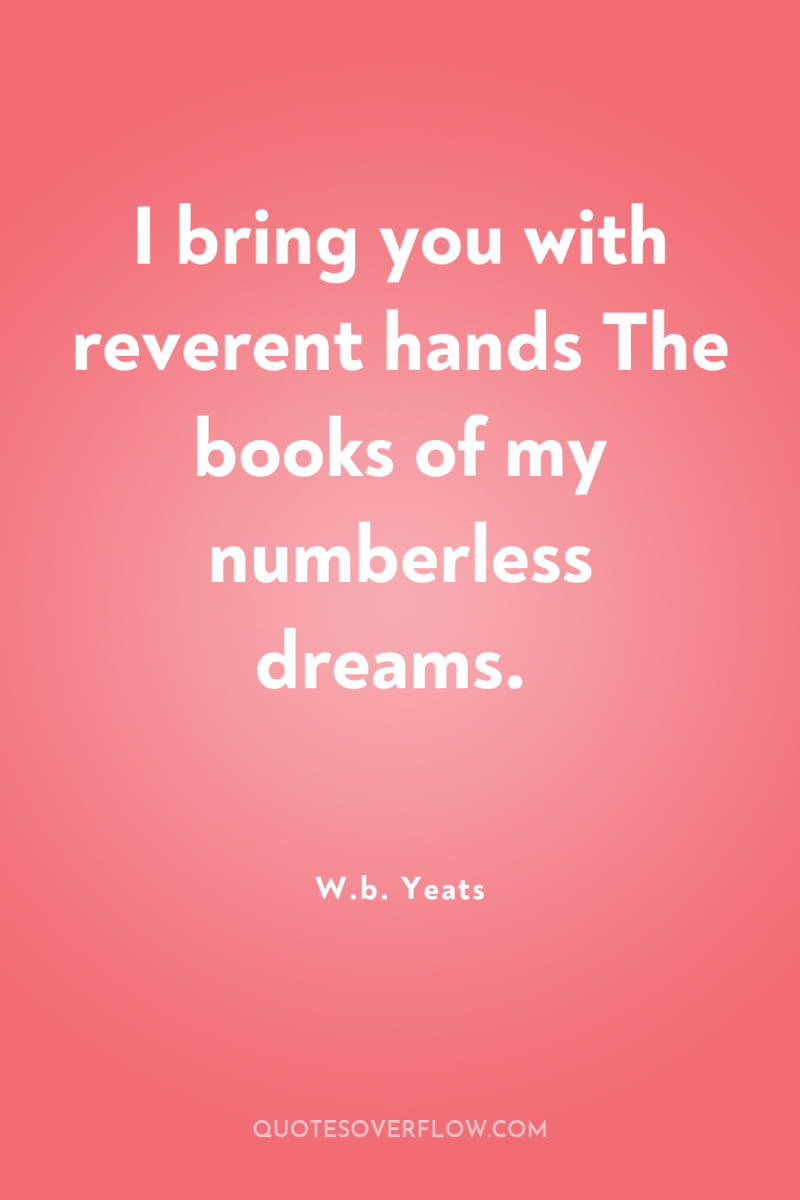
I bring you with reverent hands The books of my numberless dreams.W.b. Yeats
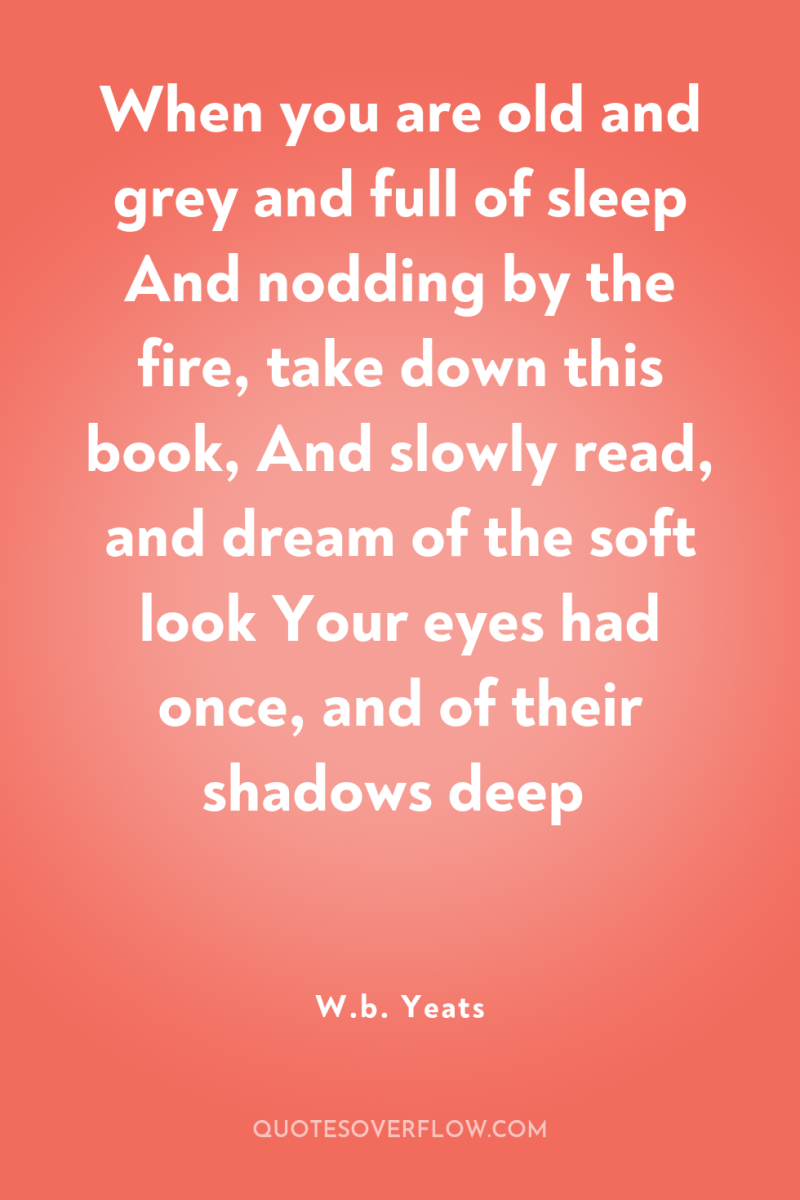
When you are old and grey and full of sleep And nodding by the fire, take down this book, And slowly read, and dream of the soft look Your eyes had once, and of their shadows deepW.b. Yeats
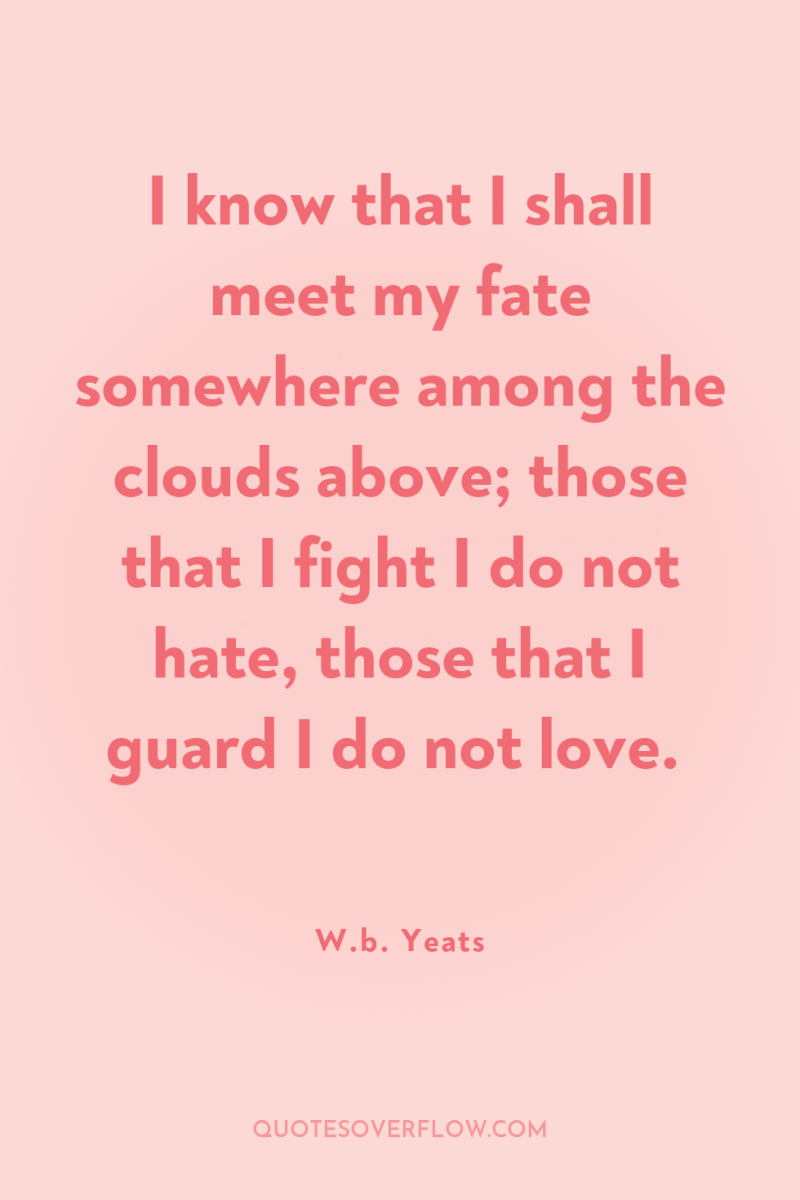
I know that I shall meet my fate somewhere among the clouds above; those that I fight I do not hate, those that I guard I do not love.W.b. Yeats
BELOVED, gaze in thine own heart, The holy tree is growing there; From joy the holy branches start, And all the trembling flowers they bear. The changing colours of its fruit Have dowered the stars with merry light; The surety of its hidden root Has planted quiet in the night; The shaking of its leafy head Has given the waves their melody, And made my lips and music wed, Murmuring a wizard song for thee. There the Loves a circle go, The flaming circle of our days, Gyring, spiring to and fro In those great ignorant leafy ways; Remembering all that shaken hair And how the wingèd sandals dart, Thine eyes grow full of tender care: Beloved, gaze in thine own heart. Gaze no more in the bitter glass The demons, with their subtle guile, Lift up before us when they pass, Or only gaze a little while; For there a fatal image grows That the stormy night receives, Roots half hidden under snows, Broken boughs and blackened leaves. For all things turn to barrenness In the dim glass the demons hold, The glass of outer weariness, Made when God slept in times of old. There, through the broken branches, go The ravens of unresting thought; Flying, crying, to and fro, Cruel claw and hungry throat, Or else they stand and sniff the wind, And shake their ragged wings; alas! Thy tender eyes grow all unkind: Gaze no more in the bitter glass.- The Two Trees .W.b. Yeats
I sat, a solitary man, In a crowded London shop, An open book and empty cup On the marble table-top. While on the shop and street I gazed My body of a sudden blazed; And twenty minutes more or less It seemed, so great my happiness, That I was blessed and could bless.W.b. Yeats
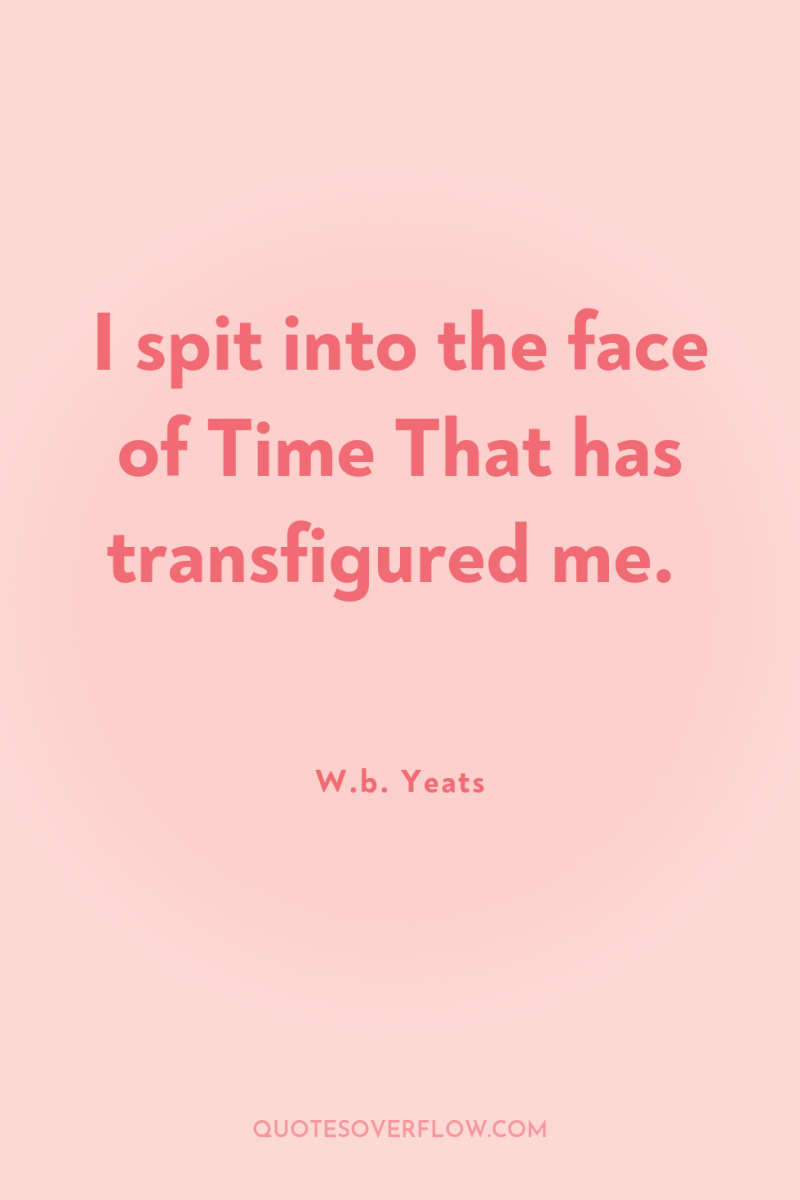
I spit into the face of Time That has transfigured me.W.b. Yeats
THOUGH you are in your shining days, Voices among the crowd And new friends busy with your praise, Be not unkind or proud, But think about old friends the most: Time's bitter flood will rise, Your beauty perish and be lost For all eyes but these eyes.W.b. Yeats
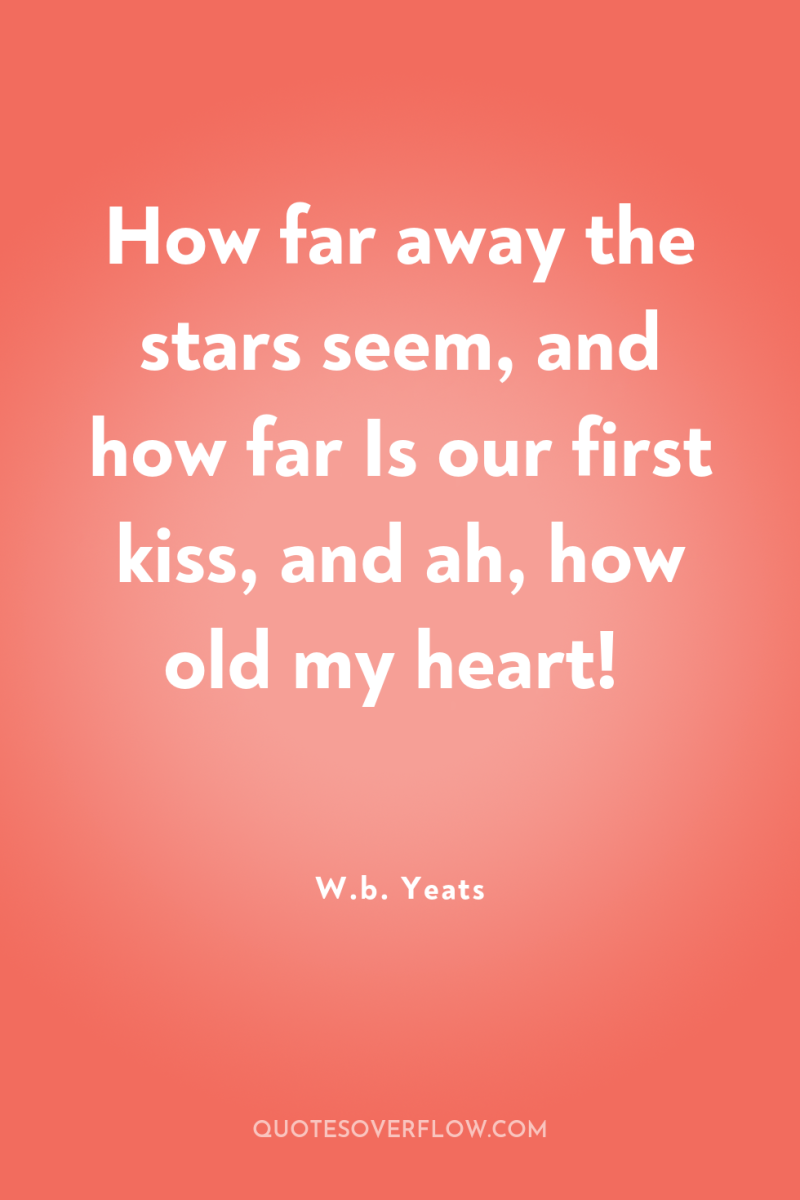
How far away the stars seem, and how far Is our first kiss, and ah, how old my heart!W.b. Yeats
Ld heads forgetful of their sins, Old, learned, respectable bald heads Edit and annotate the lines That young men, tossing on their beds, Rhymed out in love’s despair To flatter beauty’s ignorant ear. They’ll cough in the ink to the world’s end; Wear out the carpet with their shoes Earning respect; have no strange friend; If they have sinned nobody knows. Lord, what would they say Should their Catullus walk that way? .W.b. Yeats
I said: 'A line will take us hours maybe; Yet if it does not seem a moment's thought, Our stitching and unstitching has been naught.W.b. Yeats
(I) only write it now because I have grown to believe that there is no dangerous idea, which does not become less dangerous when written out in sincere and careful English. ("The Adoration of The Magi")W.b. Yeats
O cowardly amd tyrannous race of monks, persecutors of the bard, and the gleemen, haters of life and joy! O race that does not draw the sword and tell the truth! O race that melts the bones of the people with cowardice and with deceit! ("The Crucifixion Of The Outcast")W.b. Yeats
There are some doubters even in the western villages. One woman told me last Christmas that she did not believe either in hell or in ghosts. Hell she thought was merely an invention got up by the priest to keep people good; and ghosts would not be permitted, she held, to go 'trapsin about the earth' at their own free will; 'but there are faeries, ' she added, 'and little leprechauns, and water-horses, and fallen angels.' I have met also a man with a mohawk Indian tattooed upon his arm, who held exactly similar beliefs and unbeliefs. No matter what one doubts one never doubts the faeries, for, as the man with the mohawk Indian on his arm said to me, 'they stand to reason.' Even the official mind does not escape this faith. ("Reason and Unreason") .W.b. Yeats
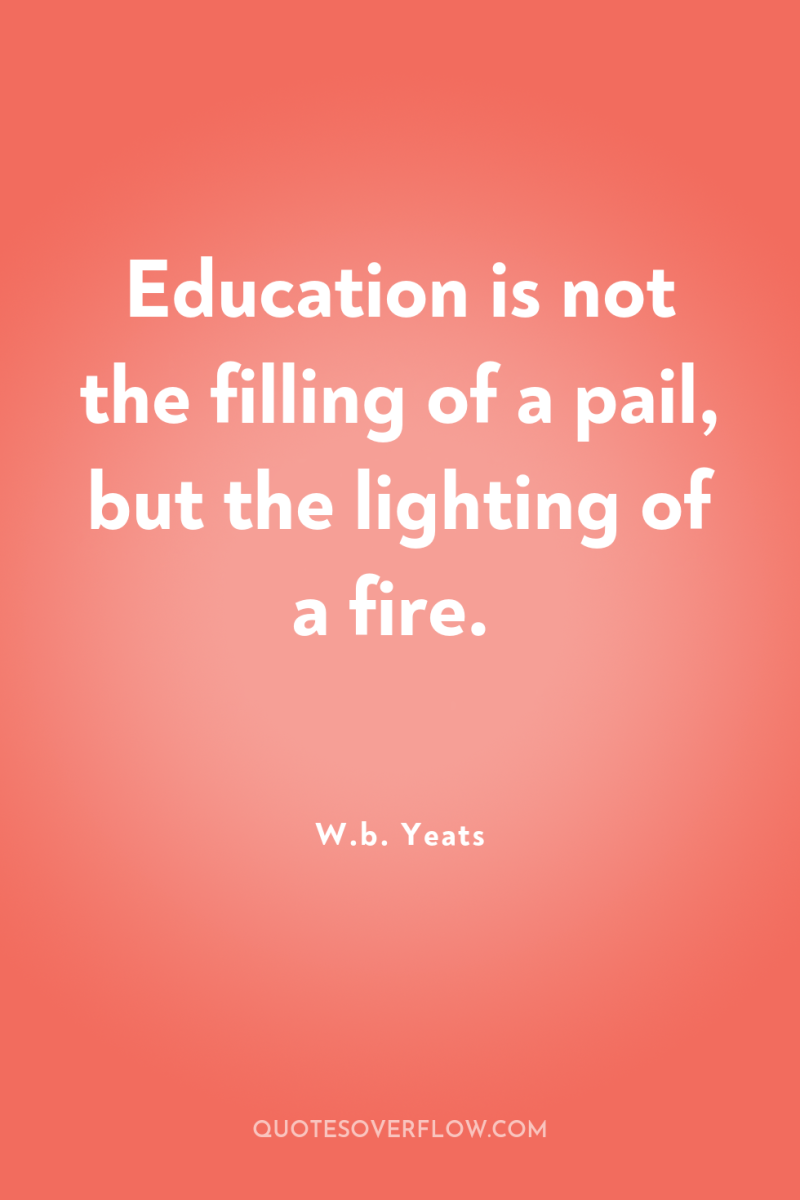
Education is not the filling of a pail, but the lighting of a fire.W.b. Yeats
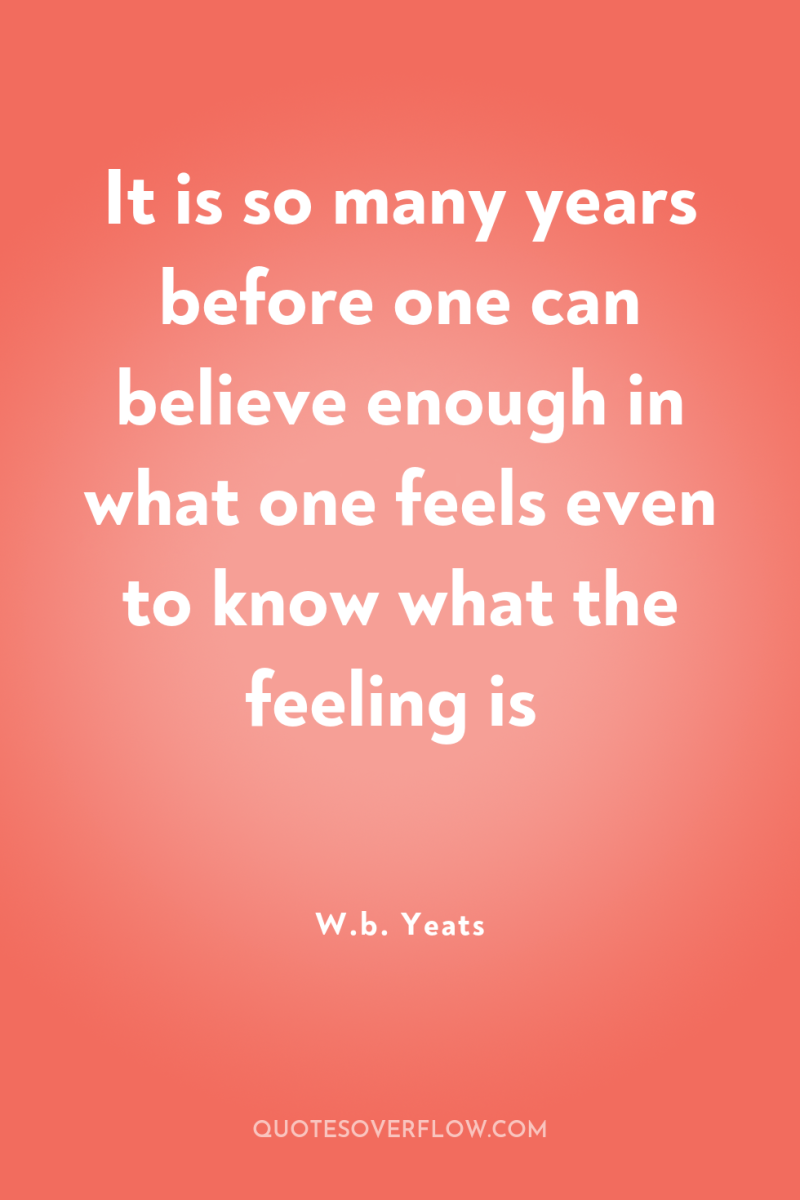
It is so many years before one can believe enough in what one feels even to know what the feeling isW.b. Yeats
What is literature but the expression of moods by the vehicle of symbol and incident? And are there not moods which need heaven, hell, purgatory, and faeryland for their expression, no less than this dilapidated earth? Nay, are there not moods which shall find no expression unless there be men who dare to mix heaven, hell, purgatory, and faeryland together, or even to set the heads of beasts to the bodies of men, or to thrust the souls of men into the heart of rocks? Let us go forth, the tellers of tales, and seize whatever prey the heart long for, and have no fear. Everything exists, everything is true, and the earth is only a little dust under our feet." (A Teller of Tales) .W.b. Yeats
As I thought of these things, I drew aside the curtains and looked out into the darkness, and it seemed to my troubled fancy that all those little points of light filling the sky were the furnaces of innumerable divine alchemists, who labour continually, turning lead into gold, weariness into ecstasy, bodies into souls, the darkness into God; and at their perfect labour my mortality grew heavy, and I cried out, as so many dreamers and men of letters in our age have cried, for the birth of that elaborate spiritual beauty which could alone uplift souls weighted with so many dreams.W.b. Yeats
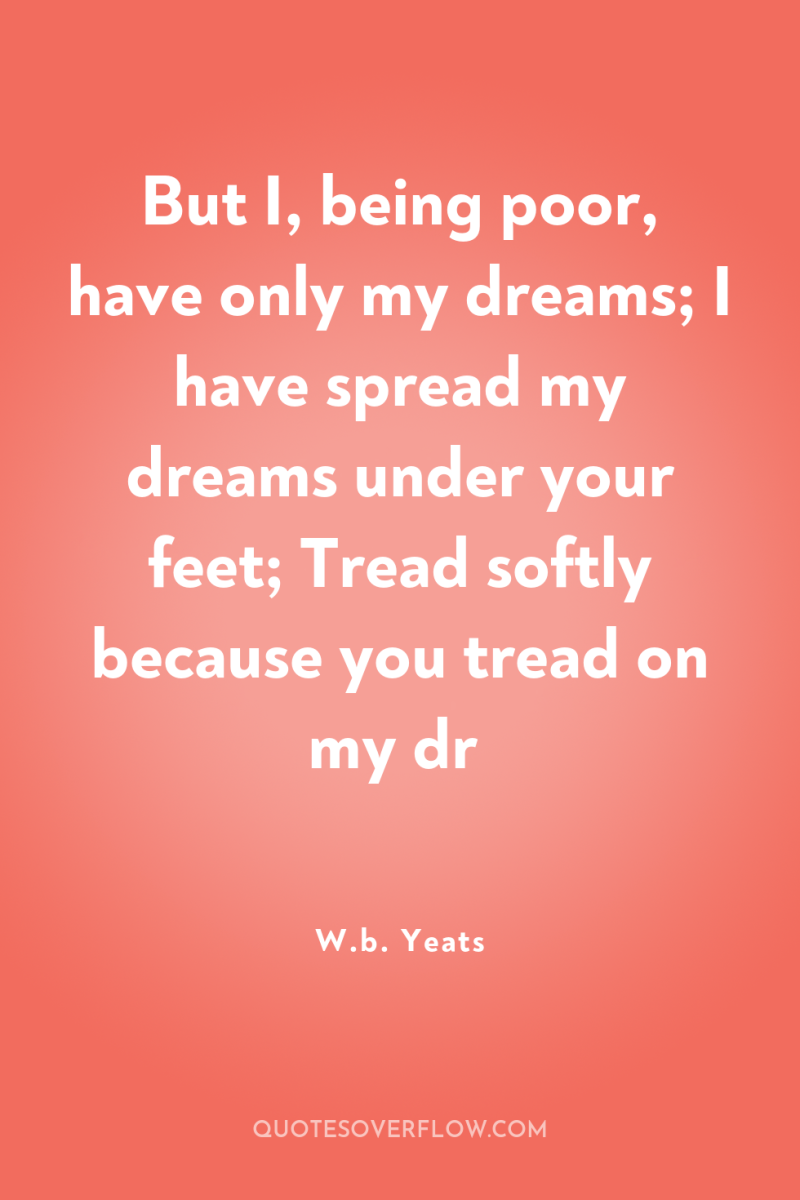
But I, being poor, have only my dreams; I have spread my dreams under your feet; Tread softly because you tread on my drW.b. Yeats
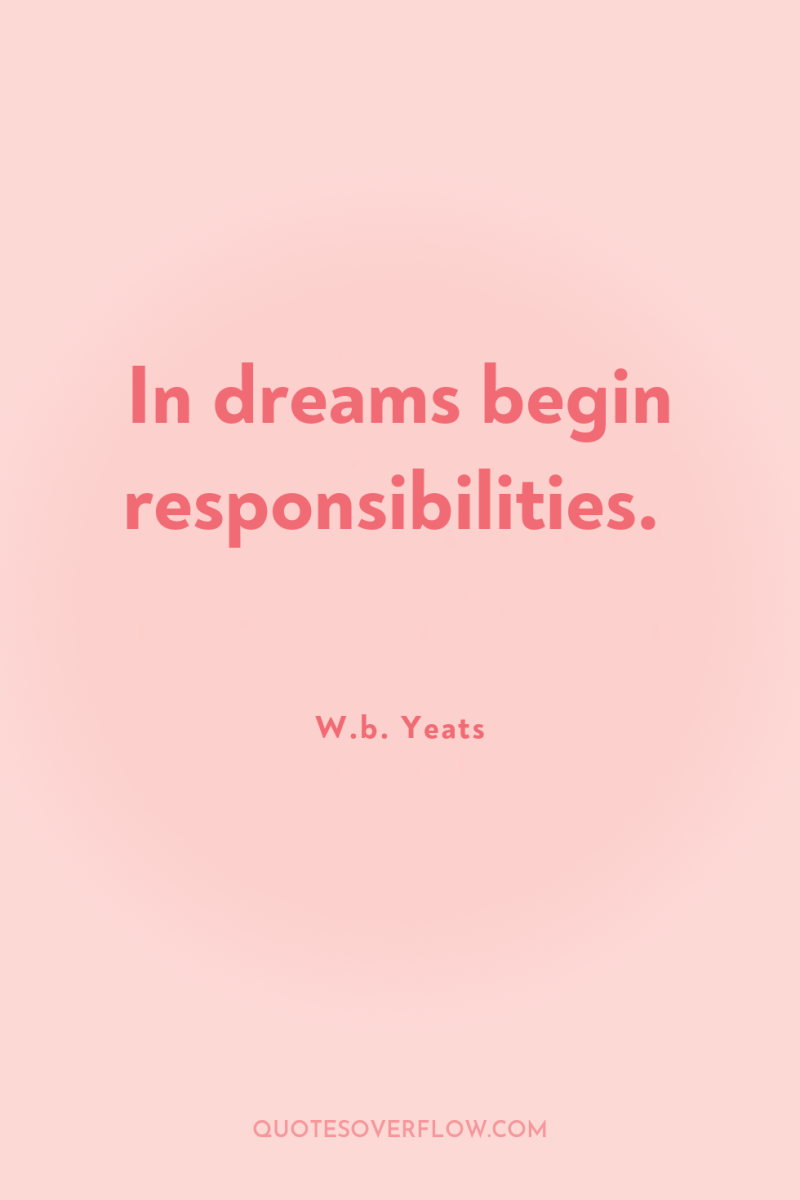
In dreams begin responsibilities.W.b. Yeats
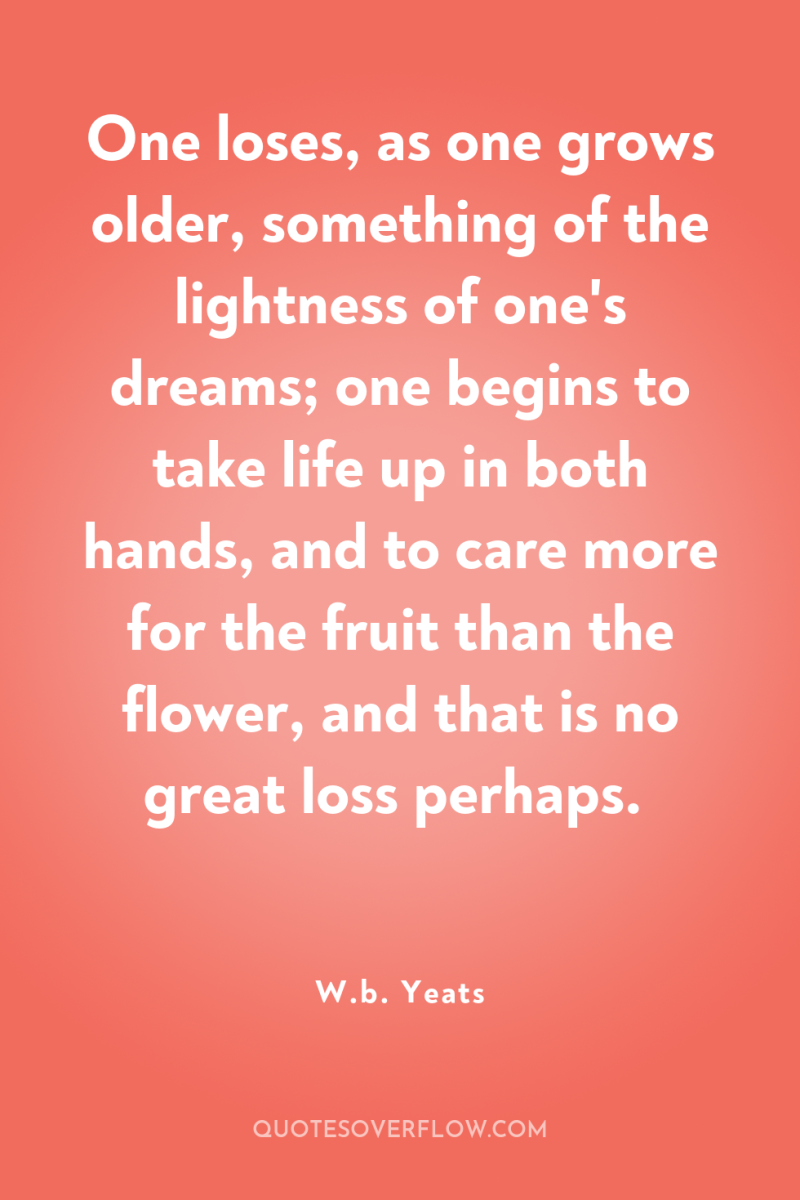
One loses, as one grows older, something of the lightness of one's dreams; one begins to take life up in both hands, and to care more for the fruit than the flower, and that is no great loss perhaps.W.b. Yeats
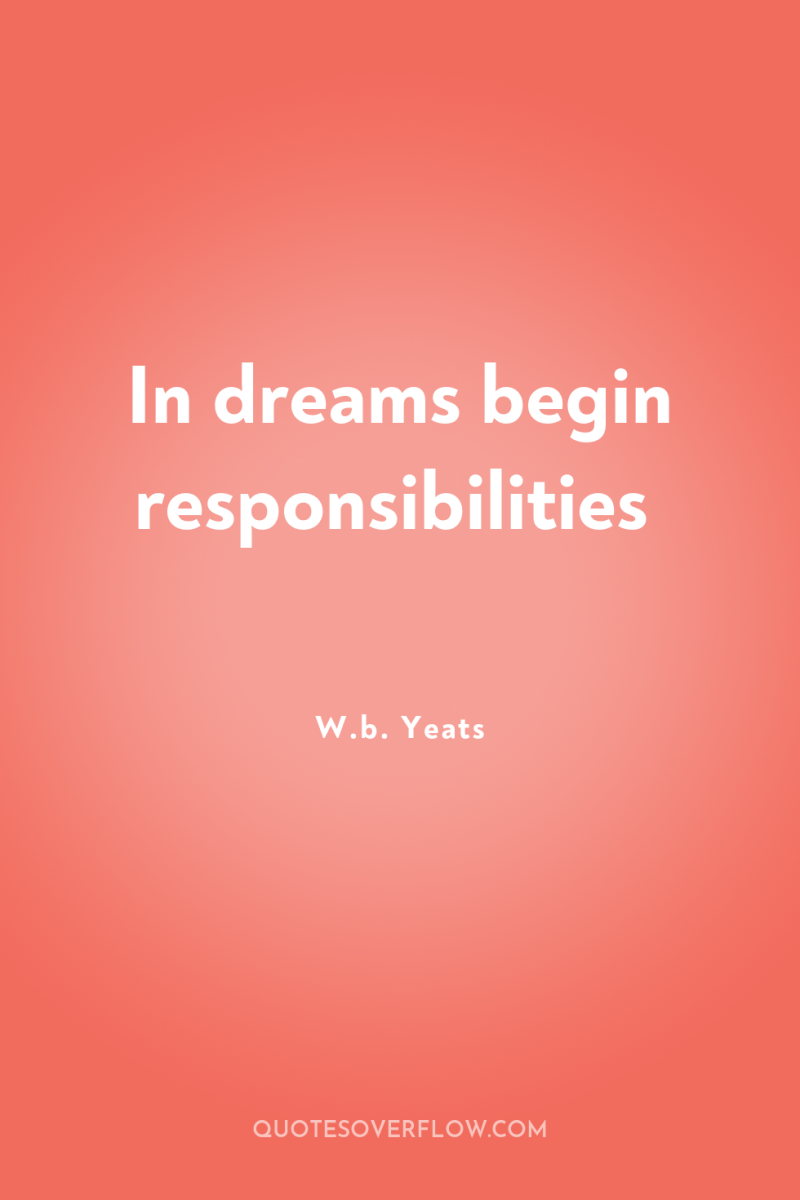
In dreams begin responsibilitiesW.b. Yeats
I have just read a long novel by Henry James. Much of it made me think of the priest condemned for a long space to confess nuns.W.b. Yeats
THAT crazed girl improvising her music. Her poetry, dancing upon the shore, Her soul in division from itself Climbing, falling She knew not where, Hiding amid the cargo of a steamship, Her knee-cap broken, that girl I declare A beautiful lofty thing, or a thing Heroically lost, heroically found. No matter what disaster occurred She stood in desperate music wound, Wound, wound, and she made in her triumph Where the bales and the baskets lay No common intelligible sound But sang, 'O sea-starved, hungry sea .W.b. Yeats
Be you still, be you still, trembling heart; Remember the wisdom out of the old days:* Him who trembles before the flame and the flood, And the winds that blow through the starry ways, Let the starry winds and the flame and the flood Cover over and hide, for he has no part With the lonely, majestical multitude*.W.b. Yeats
I carry the Sun in a Golden Cup, the Moon in a Silver Bag.W.b. Yeats
Faeries, come take me out of this dull world, For I would ride with you upon the wind, Run on the top of the dishevelled tide, And dance upon the mountains like a flame.W.b. Yeats
The tragedy of sexual intercourse is the perpetual virginity of the soul.W.b. Yeats
Being Irish, he had an abiding sense of tragedy, which sustained him through temporary periods of joy.W.b. Yeats
The Coming of Wisdom with TimeThough leaves are many, the root is one, Through all the lying days of my youth I swayed my leaves and flowers in the sun; Now I may wither into the truth.W.b. Yeats
I had fallen into a profound dream-like reverie in which I heard him speaking as at a distance. 'And yet there is no one who communes with only one god, ' he was saying, 'and the more a man lives in imagination and in a refined understanding, the more gods does he meet with and talk with, and the more does he come under the power of Roland, who sounded in the Valley of Roncesvalles the last trumpet of the body's will and pleasure; and of Hamlet, who saw them perishing away, and sighed; and of Faust, who looked for them up and down the world and could not find them; and under the power of all those countless divinities who have taken upon themselves spiritual bodies in the minds of the modern poets and romance writers, and under the power of the old divinities, who since the Renaissance have won everything of their ancient worship except the sacrifice of birds and fishes, the fragrance of garlands and the smoke of incense. The many think humanity made these divinities, and that it can unmake them again; but we who have seen them pass in rattling harness, and in soft robes, and heard them speak with articulate voices while we lay in deathlike trance, know that they are always making and unmaking humanity, which is indeed but the trembling of their lips.W.b. Yeats
Heart-mysteries there, and yet when all is said It was the dream itself enchanted me(" The Circus Animal's Desertion")W.b. Yeats
We only believe in those thoughts which have been conceived not in the brain but in the whole body.W.b. Yeats
When all is said and done, how do we not know but that our own unreason may be better than another’s truth? for it has been warmed on our hearths and in our souls, and is ready for the wild bees of truth to hive in it, and make their sweet honey. Come into the world again, wild bees, wild bees!W.b. Yeats
Literature is always personal, always one man's vision of the world, one man's experience, and it can only be popular when men are ready to welcome the visions of others.W.b. Yeats
What is literature but the expression of moods by the vehicle of symbol and incident?W.b. Yeats
Does the imagination dwell the most Upon a woman won or a woman lost?W.b. Yeats
The world is full of magic things, patiently waiting for our senses to grow sharper.W.b. Yeats
Round these men stories tended to group themselves, sometimes deserting more ancient heroes for the purpose. Round poets have they gathered especially, for poetry in Ireland has always been mysteriously connected with magic.W.b. Yeats
Tread softly because you tread on my dreamsW.b. Yeats
By the Hospital Lane goes the 'Faeries Path.' Every evening they travel from the hill to the sea, from the sea to the hill. At the sea end of their path stands a cottage. One night Mrs. Arbunathy, who lived there, left her door open, as she was expecting her son. Her husband was asleep by the fire; a tall man came in and sat beside him. After he had been sitting there for a while, the woman said, 'In the name of God, who are you?' He got up and went out, saying, 'Never leave the door open at this hour, or evil may come to you.' She woke her husband and told him. 'One of the good people has been with us, ' said he. ("Village Ghosts") .W.b. Yeats
Never shall a young man, Thrown into despair By those great honey-coloured Ramparts at your ear, Love you for yourself alone And not your yellow hair.W.b. Yeats
An Irish Airman foresees his DeathI Know that I shall meet my fate Somewhere among the clouds above; Those that I fight I do not hate Those that I guard I do not love, My country is Kiltartan Cross, My countrymen Kiltartan’s poor, No likely end could bring them loss Or leave them happier than before. Nor law, nor duty bade me fight, Nor public man, nor cheering crowds, A lonely impulse of delight Drove to this tumult in the clouds; I balanced all, brought all to mind, The years to come seemed waste of breath, A waste of breath the years behind In balance with this life, this death.W.b. Yeats
I went out to the hazel woodbecause a fire was in my headcut and peeled a hazel wandand hooked a berry to a threadand when white moths were on the wingand moth-like stars were flickering out I dropped the berry in a stream, and caught a little silver trout....( Song of Wandering Aengus)W.b. Yeats
Jonathan Swift made a soul for the gentlemen of this city by hating his neighbor as himself.W.b. Yeats
I heard the old, old, men say 'all that's beautiful drifts away, like the waters.W.b. Yeats
We can make our minds so like still water that beings gather about us that they may see, it may be, their own images, and so live for a moment with a clearer, perhaps even with a fiercer life because of our quiet.W.b. Yeats
...I was shocked and astonished when a daring little girl -- a cousin I think -- having waited under a group of trees in the avenue, where she knew [my grandfather] would pass near four o'clock on the way to his dinner, said to him, 'If I were you and you were a little girl, I would give you a doll.W.b. Yeats
It takes more courage to examine the dark corners of your own soul than it does for a soldier to fight on a battlefieldW.b. Yeats
I will arise and go now, for always night and day I hear lake water lapping... I hear it in the deep heart's core.W.b. Yeats
The Coming of Wisdom with TimeThough leaves are many, the root is one; Through all the lying days of my youth I swayed my leaves and flowers in the sun; Now I may wither into the truth.W.b. Yeats
I am persuaded that our intellects at twenty contain all the truths we shall ever findW.b. Yeats
In tombs of gold and lapis lazuli Bodies of holy men and women exude Miraculous oil, odour of violet. But under heavy loads of trampled clay Lie bodies of the vampires full of blood; Their shrouds are bloody and their lips are wet(" Oil and Blood")W.b. Yeats
The Mother Of GodThe threefold terror of love; a fallen flare Through the hollow of an ear; Wings beating about the room; The terror of all terrors that I bore The Heavens in my womb. Had I not found content among the shows Every common woman knows, Chimney corner, garden walk, Or rocky cistern where we tread the clothes And gather all the talk? What is this flesh I purchased with my pains, This fallen star my milk sustains, This love that makes my heart's blood stop Or strikes a sudden chill into my bones And bids my hair stand up? .W.b. Yeats
My fiftieth year had come and gone, I sat, a solitary man, In a crowded London shop, An open book and empty cup On the marble table-top. While on the shop and street I gazed My body of a sudden blazed; And twenty minutes more or less It seemed, so great my happiness, That I was blessed and could bless.W.b. Yeats
THE HOST is riding from Knocknarea And over the grave of Clooth-na-bare; Caolte tossing his burning hair And Niamh calling Away, come away: Empty your heart of its mortal dream. The winds awaken, the leaves whirl round, Our cheeks are pale, our hair is unbound, Our breasts are heaving, our eyes are a-gleam, Our arms are waving, our lips are apart; And if any gaze on our rushing band, We come between him and the deed of his hand, We come between him and the hope of his heart. The host is rushing ’twixt night and day, And where is there hope or deed as fair? Caolte tossing his burning hair, And Niamh calling Away, come away .W.b. Yeats
ROSE of all Roses, Rose of all the World! The tall thought-woven sails, that flap unfurled Above the tide of hours, trouble the air, And God’s bell buoyed to be the water’s care; While hushed from fear, or loud with hope, a band With blown, spray-dabbled hair gather at hand. Turn if you may from battles never done, I call, as they go by me one by one, Danger no refuge holds, and war no peace, For him who hears love sing and never cease, Beside her clean-swept hearth, her quiet shade: But gather all for whom no love hath made A woven silence, or but came to cast A song into the air, and singing past To smile on the pale dawn; and gather you Who have sought more than is in rain or dew Or in the sun and moon, or on the earth, Or sighs amid the wandering starry mirth, Or comes in laughter from the sea’s sad lips; And wage God’s battles in the long grey ships. The sad, the lonely, the insatiable, To these Old Night shall all her mystery tell; God’s bell has claimed them by the little cry Of their sad hearts, that may not live nor die. Rose of all Roses, Rose of all the World! You, too, have come where the dim tides are hurled Upon the wharves of sorrow, and heard ring The bell that calls us on; the sweet far thing. Beauty grown sad with its eternity Made you of us, and of the dim grey sea. Our long ships loose thought-woven sails and wait, For God has bid them share an equal fate; And when at last defeated in His wars, They have gone down under the same white stars, We shall no longer hear the little cry Of our sad hearts, that may not live nor die. The Sweet Far Thing .W.b. Yeats
A couple of hours after Sunset Michael Robartes returned and told me that I would have to learn the steps of an exceedingly antique dance, because before my initiation could be perfected I had to join three times in a magical dance, for rhythm was the wheel of Eternity, on which alone the transient and accidental could be broken, and the spirit set free.W.b. Yeats
O chestnut-tree, great-rooted blossomer, Are you the leaf, the blossom or the bole? O body swayed to music, O brightening glance, How can we know the dancer from the dance?W.b. Yeats
Labour is blossoming or dancing where The body is not bruised to pleasure soul.W.b. Yeats
The Celt, and his cromlechs, and his pillar-stones, these will not change much — indeed, it is doubtful if anybody at all changes at any time. In spite of hosts of deniers, and asserters, and wise-men, and professors, the majority still are adverse to sitting down to dine thirteen at a table, or being helped to salt, or walking under a ladder, of seeing a single magpie flirting his chequered tale. There are, of course, children of light who have set their faces against all this, although even a newspaperman, if you entice him into a cemetery at midnight, will believe in phantoms, for everyone is a visionary, if you scratch him deep enough. But the Celt, unlike any other, is a visionary without scratching. .W.b. Yeats
And now he is singing a bard's curse upon you, O brother abbot, and upon your father and your mother, and your grandfather and your grandmother, nd upon all your relations.' Is he cursing in rhyme?' He is cursing in rhyme, and with two assonances in every line of his curse.'(" The Crucifixion Of The Outcast")W.b. Yeats
The Cat and the Moon The cat went here and there And the moon spun round like a top, And the nearest kin of the moon, The creeping cat, looked up. Black Minnaloushe stared at the moon, For, wander and wail as he would, The pure cold light in the sky Troubled his animal blood. Minnaloushe runs in the grass Lifting his delicate feet. Do you dance, Minnaloushe, do you dance? When two close kindred meet, What better than call a dance? Maybe the moon may learn, Tired of that courtly fashion, A new dance turn. Minnaloushe creeps through the grass From moonlit place to place, The sacred moon overhead Has taken a new phase. Does Minnaloushe know that his pupils Will pass from change to change, And that from round to crescent, From crescent to round they range? Minnaloushe creeps through the grass Alone, important and wise, And lifts to the changing moon His changing eyes.W.b. Yeats
Then the woman in the bed sat up and looked about her with wild eyes; and the oldest of the old men said: 'Lady, we have come to write down the names of the immortals, ’ and at his words a look of great joy came into her face. Presently she, began to speak slowly, and yet eagerly, as though she knew she had but a little while to live, and, in English, with the accent of their own country; and she told them the secret names of the immortals of many lands, and of the colours, and odours, and weapons, and instruments of music and instruments of handicraft they held dearest; but most about the immortals of Ireland and of their love for the cauldron, and the whetstone, and the sword, and the spear, and the hills of the Shee, and the horns of the moon, and the Grey Wind, and the Yellow Wind, and the Black Wind, and the Red Wind. ("The Adoration of the Magi") .W.b. Yeats
In the great cities we see so little of the world, we drift into our minority. In the little towns and villages there are no minorities; people are not numerous enough. You must see the world there, perforce. Every man is himself a class; every hour carries its new challenge. When you pass the inn at the end of the village you leave your favourite whimsy behind you; for you will meet no one who can share it. We listen to eloquent speaking, read books and write them, settle all the affairs of the universe. The dumb village multitudes pass on unchanging; the feel of the spade in the hand is no different for all our talk: good seasons and bad follow each other as of old. The dumb multitudes are no more concerned with us than is the old horse peering through the rusty gate of the village pound. The ancient map-makers wrote across unexplored regions, 'Here are lions.' Across the villages of fishermen and turners of the earth, so different are these from us, we can write but one line that is certain, 'Here are ghosts.' ("Village Ghosts") .W.b. Yeats
Surely some revelation is at hand.W.b. Yeats
Life is a long preparation for something that never happens.W.b. Yeats
A lonely impulse of delightW.b. Yeats
Why should I blame her that she filled my days With misery, or that she would of late Have taught to ignorant men most violent ways, Or hurled the little streets upon the great, Had they but courage equal to desire? What could have made her peaceful with a mind That nobleness made simple as a fire, With beauty like a tightened bow, a kind That is not natural in an age like this Being high and solitary and most stern? Why, what could she have done, being what she is? Was there another Troy for her to burn? .W.b. Yeats
O bid me mount and sail up there Amid the cloudy wrack, For Peg and Meg and Paris' love That had so straight a back, Are gone away, and some that stay Have changed their silk for sack.W.b. Yeats